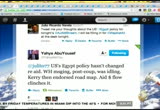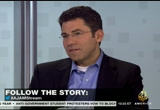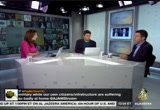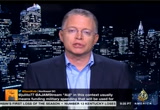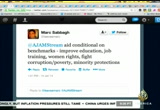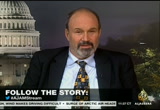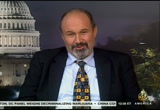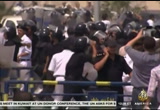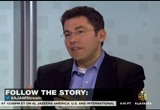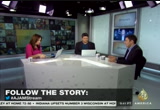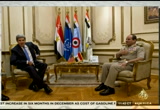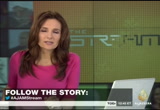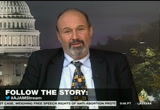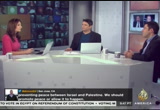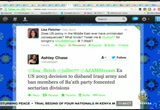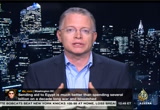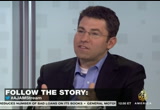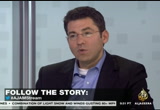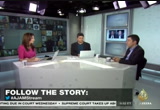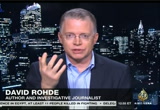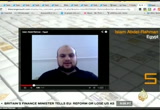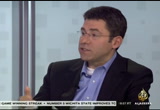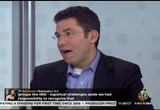tv The Stream Al Jazeera January 15, 2014 12:30pm-1:01pm EST
12:30 pm
12:37 pm
>> a lot of types, technology is available, and you would have to inform back and do software changes. but to determine, this is the issue in terms of saving lives, and to be able to access 9-1-1 became so apparent in this tragic situation. >> of course. i want to talk beyond the office building or hotel building type of situation. we understand from your association that there were actually dead zones, where 9-1-1 is going to do nothing for you in this country. and we want to look at a map here.
12:38 pm
there are very large areas of the country where 9-1-1 is not an option. why? >> on the flip side of that, clearly 98% of the population has access to 9-1-1, but these areas can be outside of nowhere, national reserves or parks, where nobody lives, and parts of the season, they're closed. there's no access to reach 9-1-1, so there are areas of the country that you can't access 9-1-1 because of the physical isolation if you will. >> but there are other reasons why maybe the system doesn't respond to the three digits. there are small rural communities.
12:39 pm
emergency service to dial the operator emergency services. in 1999, the law was passed to make 9-1-1 the national emergency number that everybody is aware. it's an amazing brand. everybody knows how to access it. >> they're going to reach every little kid in america. >> exactly, but there are situations such as these phone systems services that require extra effort, if you will that access 9-1-1. >> or information, it's so heartbreaking to think of that family and that little girl. >> i want to compliment this little girl's effort many ways, she's a hero. >> she did everything that we taught her to do, and unfortunately it didn't work. coming up next, [ speaking french ]
12:40 pm
, the soap opera swirling around france's president, and how the entrance of another leading lady might leave him without a date. later in the program, america tonight follows up on the death of a mentally ill man, brutally beaten by police officers. why activists fear the verdict in this case may be the troubling sign of things to come.
12:45 pm
12:46 pm
asked if he regretted supporting the regime and he replied: >> the u.s. has a long history of supporting powerful leaders to curry flavour, creating blow-back as a result. how can the u.s. be sure that interests. >> david polak, no guarantees. >> i agree on this point, the u.s. track record is actually quite good. there are some examples of unintended consequences. a backlash or a back fire. there are many other examples when american support for governments or for gurr illas, as the case may be had a
12:47 pm
long-term positive effect. not only for the united states, but the people of those countries. in egypt that's been the case and i think it will continue to be the case. >> i think what david is talking about here is a dilemma that american policy makers face. the long run is made up of a lot of short runs. until they figure out how to secure american interest over that short run, until we get to the longer run where we believe democratic countries are more stable and more in line with american interest, until we figure out how to do that and during transitions to democracy or one government to another, countries are unstable. until they answer that question, we are going to default to supporting the groups within the countries that we believe align with our interests and provide stability as best as possible. >> our community has been
12:48 pm
12:49 pm
there seems to be a lot of bad examples of u.s. policy in the middle east and recently, and so where do you go next? it seems is egypt going be a good example. why the blowback, and that's the question about it seems like it's a track record that hasn't been working. >> i don't think egypt is some great - it's a security success for the united states or a success for average egyptians. you don't know, there's economic challenges, educational issues. i agree that some aid has helped. i don't see it as a success. a positive story is what happens in tunisia. they are passing right now at the same time as egypt a constitution that has taken long and created a political process.
12:50 pm
there's islamist that elections in indonesia backed down. tunisia is a positive story in what is a dark post sort of early arab spring period. i didn't want to be idealistic about democracy. >> i was going to bring up, has there been clear and considerate policy in the middle east. >> of course not. consistency is difficult. take the example david rhode brought up. tunisia is the possible success story in the middle east. united states supported this. tunisia is a country the size of florida. and has left international influence. egypt is the largest country in the world. sits on the suez canal, is the
12:51 pm
means to a variety of american interests and beyond. that's where the calculations are different. in a perfect world everyone would want egyptians to live in a democracy. egypt is not a success for many, many egyptians. there has been good that the united states has done, but, of course, the deterioration of the economy and the political system post hosni mubarak suggests although we have invested in egypt we have not invested in durable things, durable areas that can help the country develop and ultimately become a more open and democratic society. we have not been able to resolve the dilemma between short-term security and longer term. until we do, we'll default to those issues of security. >> as i hear you rattle off all the leverage that europe has and
12:52 pm
$1.6 billion is a drop in the bucket. why are they allied to us, they have all the cards? cards. >> they have all the cards. >> they want american weaponry, and there's something about being aligned with the world's superpower. they benefit from the relationship as well. the fact remains they have a number of assets important to the united states. now, the question is how do we go about securing those assets for our own benefit without nurturing another authoritarian regime in the region. and, igain, there may be leaks as a result of the support for authoritarian. look at what is happening in tsinai
12:53 pm
peninsula. there's long been problems. since the coup this radical dynamic occurred where there's an uptake in violence. egypt is in for a long slog against terrorists. >> something we want to talk about, there's no question that there's potential for backlash when you deal with unstable governments. what is the right course forward. think about that.
12:55 pm
the stream. >> we are talking about whether the u.s. should continue a decades-long history of $2 billion a year in aid to the egypt. and how it could bite them down the road. you were held by the taliban for eight months. are you concerned that marginalizing the muslim brotherhood could lead to violence and force radicalization of the group. >> i am worried about that. we are looking at a scenario of where the civil war was. that killed hundreds of thousands. there are some radicals that you have to deal with with force.
12:56 pm
i am concerned about the message that we are sending where democracy works for others. i'm war ied that, you know, as we talked about in an earlier segment, this group in the sinai, they are urging physical support, they are urging the muslim brotherhood to take up arms and join them in an armed insurgency. that's a worse-case scenario. it would have been better to, you know, it couldn't have happened but better for mohamed morsi, who was losing popularity to lose in an election than a coup. >> we have a video from egypt. >> there may be new evidence of the support of the u.s. in the coup, showing that they fully endorse and support its consequences in spite the
12:57 pm
massacres and human rights violations of the junta. make they'll have evidence like what happened in the "50s. >> we do have a lot of community about egypt and we are getting voices from egypt. here we are on the other side of the world and we have our laptops and everything, you can see what we've been covering. what do americans tell, you know, egyptians on the ground, you know, as americans, you know. what is the message that should be given. >> i think that it's clear that the message that we should be sending is one that president obama said when he gave a people in 2007 about the uprising. he said, "we should look upon the changes in the region without abdickating our value", the president and others have
12:58 pm
principles. >> that's not suggesting that it would fundamentally change the situation on the ground. egypt would have unfolded as it has, had the president said those things. we would not be in as difficult a position with egyptian public opinion, had we stuck to the principles. i want to respond to the video. he's giving too much credit to the united states. the president obama administration has been surfing the news cycles, accommodating to outcomes that egyptians have been producing. my message is, "it's in your hands. we effect things at the margin. we don't have the influence we believe we do. this is about your country, you need to pave the way forward. >> what do you think the u.s. role should be moving forward.
12:59 pm
>> i agree with that steven said. we should step back and look at local actors and see where there's countries with local countries that we can work with. were there isn't, we should step back. there's a broader public in the region. i think most people want accountable governments in some form. they wants security and be part of the global economy. they want to be part of the international community. we should be humble and use economic tools and work through and with local partners and stand by the principals. people see our hypocrisy when we are not substantiate. >> thank you for all of our guests for your discussion. we'll see you online next time.
1:00 pm
117 Views
Uploaded by TV Archive on

 Live Music Archive
Live Music Archive Librivox Free Audio
Librivox Free Audio Metropolitan Museum
Metropolitan Museum Cleveland Museum of Art
Cleveland Museum of Art Internet Arcade
Internet Arcade Console Living Room
Console Living Room Books to Borrow
Books to Borrow Open Library
Open Library TV News
TV News Understanding 9/11
Understanding 9/11

